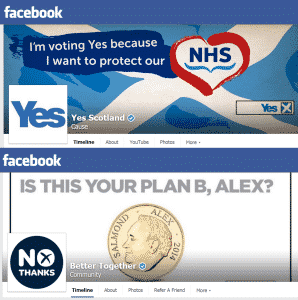 Will social media win the Scottish referendum? Facebook says that there have been over 10 million comments, posts, likes and shares about Scottish independence in the month of August. The Yes campaign has nearly 300,000 Facebook likes and nearly 100,000 followers on Twitter. In comparison the No campaign is trailing behind with over 200,000 Facebook likes and only 40,000 followers on Twitter.
Will social media win the Scottish referendum? Facebook says that there have been over 10 million comments, posts, likes and shares about Scottish independence in the month of August. The Yes campaign has nearly 300,000 Facebook likes and nearly 100,000 followers on Twitter. In comparison the No campaign is trailing behind with over 200,000 Facebook likes and only 40,000 followers on Twitter.
But how far do these figures go to predict the outcome of the referendum? Does chatter on social media encourage people to head to the polling station? Do Twitter followers and Facebook likes mean votes? How many are voters and how many are Brits without a vote or media?
The independence campaign is unique in the way that 16 and 17 year olds are able to vote. This age group is more receptive to social media activity than their elders. Young people are less swayed by politicians making grand speeches on the 10 o clock news – they are influenced by being appealed to through digestible information, easily accessible through social media. Is social media a silver bullet for middle-aged politicos like Alistair Darling or Alex Salmond who have to court these young voters and persuade them to come out and vote?
But will social media win the Scottish referendum when it comes down to it?
In the final week of the campaign the SNP announced that they would be targeting pensioners through the post. In the most important week of the campaign it is clear where the SNP believe that the campaign comes down to – not the tech-savvy youth but the reliable elderly who can be counted on to get out and vote.
Unlike most campaigns, in this campaign social media is not needed to encourage people to go to the polling station because a staggering 97 per cent of Scottish adults have already registered to vote. Nor is social media being used to keep the issue relevant and in the news – the traditional media have no choice but to cover it.
But it is possible that social media is being used by each side to have a slight advantage over the other. In a campaign as close as this one, both sides need any advantage they can get. Social media may just be enough to push one side above the other.
Image courtesy of creativedoxfoto / FreeDigitalPhotos.net

